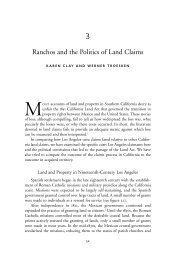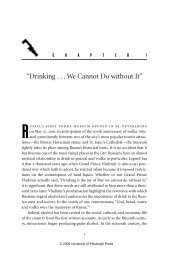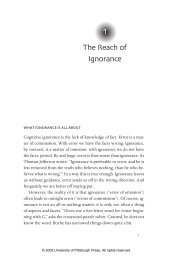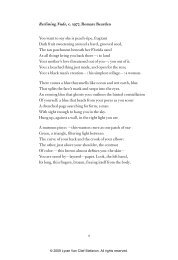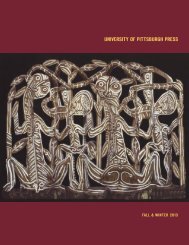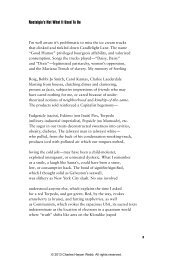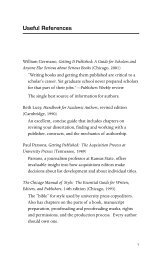History and Philosophy of Science - University of Pittsburgh Press
History and Philosophy of Science - University of Pittsburgh Press
History and Philosophy of Science - University of Pittsburgh Press
You also want an ePaper? Increase the reach of your titles
YUMPU automatically turns print PDFs into web optimized ePapers that Google loves.
PHILOSOPHY OF SCIENCE NEW<br />
2011 • 232 pp.<br />
978-0-8229-6163-5 • Paper • $29.95<br />
ITEM NO. 508 • SALE PRICE $23.96<br />
eBook available<br />
<strong>Philosophy</strong> <strong>of</strong> <strong>Science</strong><br />
<strong>Science</strong> Transformed?<br />
Debating Claims <strong>of</strong> an Epochal Break<br />
edited by AlFreD norDMAnn, HAnS rADDer,<br />
<strong>and</strong> GreGor SCHIeMAnn<br />
“<strong>Science</strong> Transformed? is an important, readily accessible<br />
book that focuses on a crucial contemporary<br />
issue: the pr<strong>of</strong>ound transformation <strong>of</strong> science,<br />
technology, <strong>and</strong> society <strong>of</strong> the past few decades. We<br />
are witnessing a break <strong>of</strong> an ‘epochal nature,’ <strong>and</strong><br />
Nordmann, Radder, <strong>and</strong> Schiemann have provided<br />
us with valuable insights into what is happening.”<br />
—Silvan Schweber, Br<strong>and</strong>eis <strong>University</strong><br />
“Has science changed fundamentally during the last<br />
half century? Readymade concepts abound that<br />
claim as much: from postnormal <strong>and</strong> technoscience<br />
to the advent <strong>of</strong> a mode-2. Few are substantiated<br />
empirically. This collection does just that: probing<br />
the theses <strong>of</strong> an epochal break from a range <strong>of</strong> disciplinary<br />
vantage points, unveiling the complexity<br />
behind the fashionable rhetoric, providing fascinating<br />
insights into the new ways <strong>of</strong> research.”<br />
—Peter Weingart, Bielefeld <strong>University</strong><br />
Advancements in computing, instrumentation, robotics, digital imaging, <strong>and</strong><br />
simulation modeling have changed science into a technology-driven institution.<br />
Government, industry, <strong>and</strong> society increasingly exert their influence<br />
over science, raising questions <strong>of</strong> values <strong>and</strong> objectivity. these <strong>and</strong> other pr<strong>of</strong>ound<br />
changes have led many to speculate that we are in the midst <strong>of</strong> an epochal break<br />
in scientific history.<br />
this edited volume presents an in-depth examination <strong>of</strong> these issues from philosophical,<br />
historical, social, <strong>and</strong> cultural perspectives. It <strong>of</strong>fers arguments both for<br />
<strong>and</strong> against the epochal break thesis in light <strong>of</strong> historical antecedents. Contributors<br />
discuss topics such as: science as a continuing epistemological enterprise; the<br />
decline <strong>of</strong> the individual scientist <strong>and</strong> the rise <strong>of</strong> communities; the intertwining <strong>of</strong> scientific<br />
<strong>and</strong> technological needs; links to prior practices <strong>and</strong> ways <strong>of</strong> thinking; the alleged<br />
divide between mode-1 <strong>and</strong> mode-2 research methods; the commodification<br />
<strong>of</strong> university science; <strong>and</strong> the shift from the scientific to a technological enterprise.<br />
Additionally, they examine the epochal break thesis using specific examples, including<br />
the transition from laboratory to real world experiments; the increased reliance<br />
on computer imaging; how analog <strong>and</strong> digital technologies condition<br />
behaviors that shape the object <strong>and</strong> beholder; the cultural significance <strong>of</strong> humanoid<br />
robots; the erosion <strong>of</strong> scientific quality in experimentation; <strong>and</strong> the effect <strong>of</strong> computers<br />
on prediction at the expense <strong>of</strong> explanation.<br />
Whether these events represent a historic break in scientific theory, practice, <strong>and</strong><br />
methodology is disputed. What they do <strong>of</strong>fer is an important occasion for philosophical<br />
analysis <strong>of</strong> the epistemic, institutional <strong>and</strong> moral questions affecting current<br />
<strong>and</strong> future scientific pursuits.<br />
UNIVERSITY OF PITTSBURGH PRESS • <strong>History</strong> <strong>and</strong> <strong>Philosophy</strong> <strong>of</strong> <strong>Science</strong> 9





